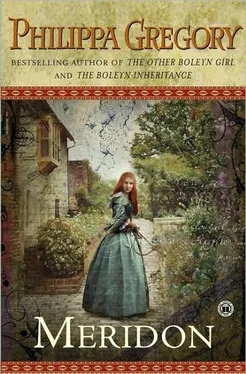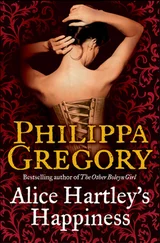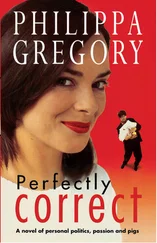‘Your young man,’ she said with quiet satisfaction as she saw Will. She did not seem in the least surprised.
I held her bag and the cage as Gerry jumped down from his horse and lifted her up and then mounted behind her. I passed the bundle up and then the cage. The starling, annoyed by the jolting, began to sing loudly. I shot a sly look at Will.
He was not fuming at all, he was not seething with irritation. He sat on his horse as easily and as calmly as if he were taking the air on Wideacre.
‘Quite ready, my darling?’ he asked me, and I started to hear an endearment from him and then smiled and coloured up like a silly wench.
Quite ready? Nothing and no one you have forgotten? No one else you would like to bring with us? No chimney sweeps, or lap-dogs, or crossing boys?’
‘No,’ I said. I took back my reins and swung myself up into the saddle and then burst into laughter.
‘Do tell me you’re glad I brought the starling,’ I begged as Gerry led the way south, towards the river.
Will laughed joyously, his brown eyes filled with love. ‘I am delighted,’ he said.
40
Gerry led us southwards, across the Green Park and then down the Vauxhall road, a part of the city I did not know. It was odd, sometimes like countryside, sometimes a town. There were little fields and byres where they kept dairy cattle, and carts with young women riding on them came down the road towards London and waved to us. There were a few grand houses too, and many many tumbledown cottages with barefoot children peeping out of unglazed windows. We crossed the river by the Vauxhall Bridge. Sea threw his head up at the sound of his hooves ringing hollow, and I held him still for a moment and looked downriver.
The early morning mist was slowly lifting, the river was all silver and pearl. There were river-trading ships with sails, ghostly in the mist, and wherry boats and fishing smacks fading in and out of sight as the mist curled around them. The city eastwards gleamed like a new Jerusalem in the morning sunlight.
‘It could be a wonderful place,’ Will said softly beside me. ‘Even now, if they used the new machines they are inventing, and the new ideas they have, for the benefit of the poor. If they thought of the land and how to keep it sound, if they thought of the river and how to keep it clean. This could be the most wonderful city in the world, and the most wonderful country.’
‘People always say that,’ I said. ‘People always say it could have been good. But then they say it’s too late to go back.’
Will shook his head. ‘If we go on as we are going, with people thinking of nothing but making fortunes and caring nothing for their workers and caring nothing for the land then they will regret it,’ he said certainly. ‘They think they can count the cost of living like that – a high rate of accidents perhaps, or no fish in a river where fish once used to spawn. But the cost is even higher. They teach themselves, and they teach their children a sort of callousness, and once people have learned that lesson it is indeed too late. There is nothing then to hold back rich people from getting richer at the expense of the poor, nothing to protect the children, to protect the land. The rich people make the laws, the rich people enforce them. Time after time we have a chance to decide what matters most – wealth, or whether people are happy. If they could only stop now, and think of the happiness for the greatest number of people.’
I smiled at him. ‘They’d tell you that the way to make people happy is to make them rich,’ I said.
Will shrugged and the horses moved forward. ‘I don’t think people can be happy unless they are well fed and well housed and have a chance at learning,’ he said. ‘And you’ll never do that by opening the market place and saying it’s all free to those with money to buy it. Some things are too important to be traded in a free market. Some things people should have as a right.’
I thought of the Havering land and the clearing of the Havering village. I thought of some of the people I had met in London who had no more skill nor wit than Da, but lived in great houses and dined off gold plate. And I thought of her, and of me, dirty-faced little children with never a farthing of a chance to get out of that miserable life and think of something other than getting and keeping money.
‘I got from the bottom to the very top,’ I said. I thought of Robert Gower’s long struggle from the failed cartering business, to the horse-riding act, and then his own show. And I thought of what it had cost him. It had made him a man with stone where his heart should be, and it had made his son a murderer.
‘It’s not the rising or falling which matters,’ he said. ‘There shouldn’t be a bottom where children are cold and hungry and beaten. Not in a rich world.’
I nodded, and we rode in silence for a little while.
‘You’re pale,’ he said. ‘Are you well?’
‘I’m all right,’ I said, lying again. I was deathly tired, but I wanted to ride to my home, to Wideacre. I wanted to ride without stopping until midday when we might have enough money between the four of us to buy bread and cheese and a flask of ale. ‘I’m all right,’ I said.
Emily looked back. ‘She does look poorly,’ she confirmed. She scanned my face. ‘You’re still too weak to be up all night, Miss Sarah,’ she said. She looked at Will. ‘She didn’t ought to be riding,’ she said.
Will glanced at me in surprise. ‘Are you still weak?’ he asked. ‘I heard you were ill, but then I heard you were married and I thought you must have recovered.’
I gave a wry smile. ‘I’m well enough,’ I said.
‘Don’t ‘e know?’ demanded Emily of me. ‘Don’t ‘e know what happened?’
‘Apparently not,’ Will said tightly. ‘What is this?’
I looked down. Sea’s neck and mane were rippling under my gaze as if we were swimming through water. The sun was growing brighter, its glare hurt my eyes and I was hot, wrapped up in my cape.
‘It’s nothing,’ I said softly. ‘I’ll tell you later, Will.’
‘She’s awful white,’ Emily said. Gerry pulled his horse up and looked anxiously back. ‘She shouldn’t be riding,’ Emily said. ‘Not after being out all night.’
‘What the devil is wrong?’ Will said in sudden impatience. ‘Sarah! What’s the matter.’
‘Nothing,’ I said irritably. ‘I was ill for a long time, and now I am better. I get a little tired that’s all.’
‘Are you well enough to ride?’ he asked.
My tough little Rom spirit rose up in me. ‘Of course,’ I said. The road was shimmery and bright, I half closed my eyes.
‘Ride all the way home?’ Will demanded.
‘Of course,’ I said again, my voice was softer, my throat seemed to be tightening like it had done when I had the fever. ‘How else can we get there?’
‘Are you sure?’ he asked again, and now his voice was tender.
‘Oh Will,’ I said wearily, accepting my weariness and my weakness at last, just as I had accepted the joy in my body earlier in this long night. ‘Oh Will, my love, please help me. I’m as sick as a dog,’ I said.
Then I pitched forward on to Sea’s neck and the darkness of the road came up to meet me.
When I came to, it was broad daylight and I was being jolted, rhythmically like a rocking cradle. I was lying on straw, wrapped warm in my heavy cloak, bedded as snug as a winter fieldmouse. I blinked up at the winter sky, bright and blue above me, and I looked to my right and there was Will Tyacke unstoppering a flask of ale and looking smug.
‘Drink,’ he said and held it to my lips. It slid down in a cool malty swallow.
‘Whaa?’ I asked.
‘More,’ he said firmly, and I gulped again and my parched throat was eased at once.
Читать дальше
Конец ознакомительного отрывка
Купить книгу












